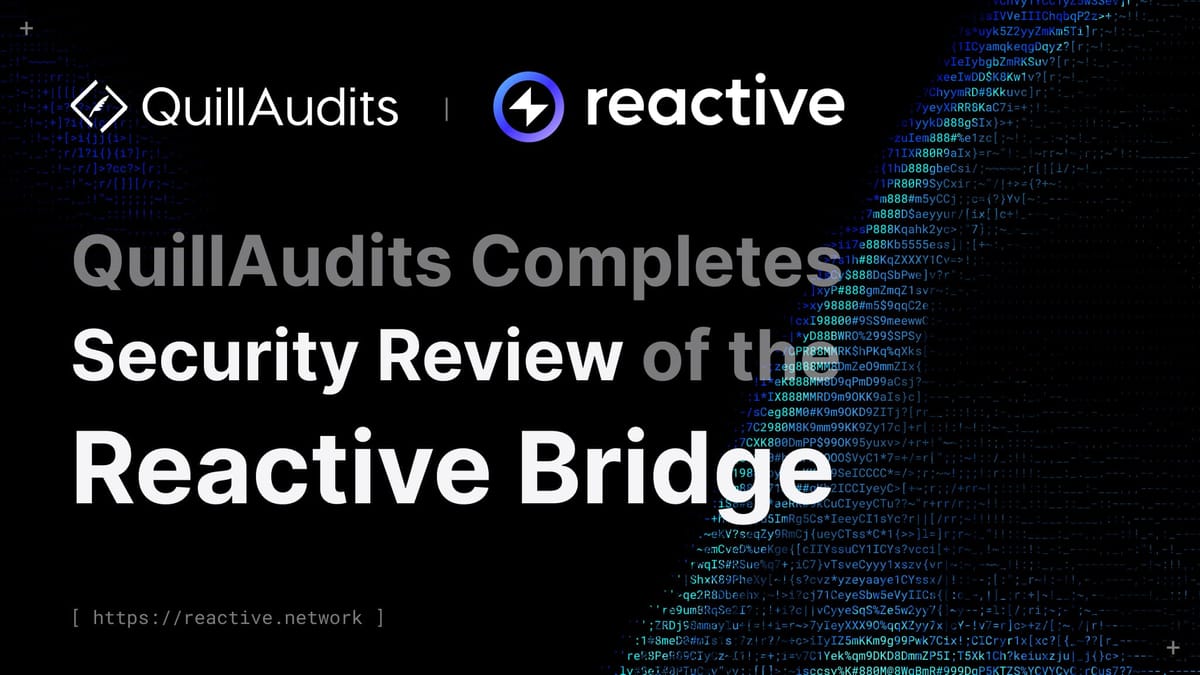QuillAudits Completes Security Review of the Reactive Bridge
To ensure a secure PRQ → REACT migration, Reactive Network partnered with QuillAudits for a full audit of its bridge contracts. All high and medium-severity issues were addressed before mainnet launch, reinforcing our commitment to safe, reliable cross-chain infrastructure.

As the Reactive Network continues its transition from PRQ to REACT, one thing remains at the center of everything we do—security.
With thousands of users bridging tokens across Ethereum and BNB Smart Chain into the Reactive Network, it’s crucial to make sure every component of that process is safe, predictable, and resilient. To ensure this, we engaged QuillAudits, one of the industry’s most trusted smart contract audit firms, to review our bridge infrastructure in depth.
We’re happy to share that the Reactive Bridge contracts have been successfully audited, and key issues identified during the process have been addressed and resolved prior to mainnet launch.
What Was Audited?
The audit focused on the core components that power the PRQ → REACT token migration and broader cross-chain functionality:
- ReactiveBridge.sol
- Bridge.sol
- AbstractBridgehead.sol
- BridgeLib.sol
- AbstractFeeCalculator.sol
- AbstractDispenser.sol
These contracts collectively handle cross-chain communication, fee processing, event validation, and message delivery across chains. In simple terms, they make the bridge work securely behind the scenes.
The code reviewed was from the public GitHub repository under the dec24-prerelease branch, and the audit was performed on both Ethereum and BSC deployments.
What Did QuillAudits Find?
The audit team identified a total of 5 issues across different severity levels:
- 2 High Severity (Resolved)
- 2 Medium Severity (1 Resolved, 1 Acknowledged with design clarification)
- 1 Low Severity (Acknowledged)
Some of the critical fixes included:
- Correcting event subscriptions to ensure failed transactions don’t go unnoticed.
- Preventing a potential Denial of Service caused by incorrect message status transitions.
- Adding bounds to fee configurations, ensuring users aren’t exposed to extreme transaction costs.
The full audit report is available for transparency here.
Why This Matters for PRQ → REACT Migration
Token bridges are notoriously vulnerable if not implemented properly—misconfigured contracts can lead to frozen assets or even permanent loss of funds.
By conducting this audit before enabling user access to the Reactive Bridge, we’ve taken a major step in safeguarding your assets. Whether you're swapping tokens through the Token Portal or preparing to stake REACT, you can do so with greater confidence.
What’s Next?
Security isn’t a checkbox—it’s a continuous process. While this audit addressed vulnerabilities at launch, we remain committed to:
- Ongoing monitoring of bridge operations
- Community bug bounties in future phases
- Future third-party audits for new components
As the Reactive Network ecosystem evolves, audits like this are part of how we build trust and stability—from token migration to smart contract execution and beyond.
About Reactive Network
The Reactive Network, pioneered by PARSIQ, ushers in a new wave of blockchain innovation through its Reactive Smart Contracts (RSCs). These advanced contracts can autonomously execute based on specific on-chain events, eliminating the need for off-chain computation and heralding a seamless cross-chain ecosystem vital for Web3’s growth.
Central to this breakthrough is the Inversion of Control (IoC) framework, which redefines smart contracts and decentralized applications (DApps) by imbuing them with unparalleled autonomy, efficiency, and interactivity. By marrying RSCs with IoC, Reactive Network is setting the stage for a transformative blockchain era, characterized by enhanced interoperability and the robust, user-friendly foundation Web3 demands.
Website | Blog | Twitter | Telegram | Discord | Docs





